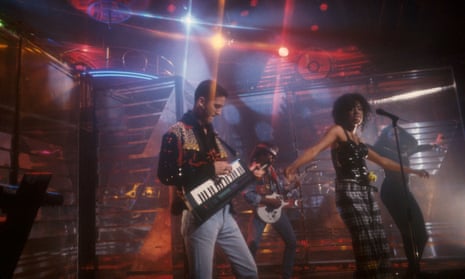Mark Moore, producer
I was one of the first DJs in the UK to play house music, and I had this idea for a record made of a load of samples. At the time, the dance label Rhythm King had opened across the road from where I was living in London, so I was always hanging out there. They paired me up with Pascal Gabriel [co-writer of Bomb the Bass’s sample-heavy Beat Dis] and I played him all these bits off various records. We put them on to a cassette – taping 10 seconds of this record, three seconds of that one – and when Rhythm King heard it they said: “We’ll put you in the studio.”
It only took a few days. We thought it sounded amazing and I knew it would work in the clubs I played, especially the mixed and gay clubs, like Pyramid at Heaven and the Mud Club. But we thought it would be two years before we got any mainstream success – pop music just did not sound like that in 1988! Things were coming through, such as Bomb the Bass and Coldcut, but pop was Kylie and Jason. Rhythm King said it was too weird for radio, and asked for a seven-inch mix. We didn’t want to, so we did a deliberately awful mix, and they said: “OK, you win.”
It got to No 3 before Radio 1 had even played it. I remember walking to my house and this car coming down the road with music blaring out – inside were four girls, singing along to it and nodding their heads. When they saw me they started screaming. I don’t know if they recognised me or were just really enjoying the record.
The friends I put in the band – Linda Love on keyboards, Anna Goodman, Chilo Eribenne, Michelle Ndrika – helped make it look good on TV, but we didn’t go down well on Top of the Pops because the producers were wondering why we didn’t take it seriously. I didn’t take ecstasy at Top of the Pops that time, but I did for [second hit] Superfly Guy, and at one point I really didn’t know where I was, but I thought the lights were really pretty.
There’d been acid house tracks before, like Jack Your Body, but the UK public at large considered them to be novelty records. Once Theme from S-Express came along, it was like year zero. Shortly after, it was the second summer of love. We took the ethos of what had come before and kickstarted the UK house scene.
Pascal Gabriel, producer
There was no sampling equipment in those days, so Mark just played me bits of records he thought would be good to sample, such as Rose Royce’s Is It Love You’re After?, and we put things in sequence on a cassette. People didn’t pay for samples back then, because nobody knew what the law was. We used something like 14 different ones, and received a letter from our American lawyer saying: “Bomb the Bass was bad enough, but S’Express is a disaster.” In the end, everything was settled but it took five years.
Karen Finley, the American performance artist, was really good about us using her sample: “Drop that ghetto blaster!” We wrote to her and she said: “You can have it for free, it’s fine.” Her contribution was a very small line, so how much would she have made from that? Maybe five per cent? She was cool – I’d have probably done the same thing. It’s not all samples, though: I wrote the bassline, and the “S-express” vocal line is original. We used a can of hairspray for the hi-hats. I was bored with the average hi-hat sound and I thought about what we could do to make it different – so we sampled hairspray. The whole thing cost £500 to make.
It was a really liberating new way to make music, with a collage of audio. There were other people from Detroit already making acid house, but what we did was use Detroit house as a backbone, and patch samples on top. We were breaking a lot of new ground – it was a dance record, but it was also meant to be an experimental record. So when we realised it was being picked up by this new wave of music lovers, it was brilliant. I never knew the song would be huge – it was a very exciting moment when it went to No 1. I went to the Rhythm King office because they hadn’t paid me yet, and all the phones were ringing off the hook with dealers saying: “We need more copies, we’ve sold out.” I’ve heard it so many times that I don’t particularly want to hear it any more, but when you see people dancing to it you always feel moved to get up.

Comments (…)
Sign in or create your Guardian account to join the discussion